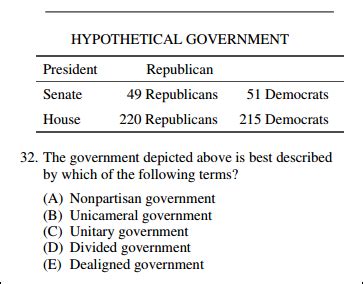Prepare for the AP Government exam with this comprehensive practice exam. This simulated test covers the key concepts of US government and politics, providing you with valuable insights into the material.

Question 1: Constitutional Principles
Which of the following is a fundamental principle of the US Constitution?
(A) Judicial supremacy
(B) Federal supremacy
(C) Limited government
(D) Popular sovereignty
Question 2: The Legislative Branch
The House of Representatives has the sole power to:
(A) Declare war
(B) Override a presidential veto
(C) Impeach the president
(D) Confirm presidential appointments
Question 3: The Executive Branch
The president can veto legislation passed by Congress, which can be overridden by a:
(A) Majority vote in both chambers
(B) Two-thirds vote in both chambers
(C) Unanimous vote in both chambers
(D) Majority vote in one chamber
Question 4: The Judicial Branch
The Supreme Court has the power to:
(A) Declare laws unconstitutional
(B) Reverse the decisions of lower courts
(C) Appoint federal judges
(D) Enact new laws
Table 1: Branches of Government and Their Functions
| Branch | Functions |
|---|---|
| Legislative | Makes laws |
| Executive | Enforces laws |
| Judicial | Interprets laws |
Question 5: Federalism
The principle of federalism divides power between:
(A) The national and state governments
(B) The three branches of government
(C) The political parties
(D) The president and Congress
Question 6: Civil Liberties
Which of the following is NOT a First Amendment right?
(A) Freedom of speech
(B) Freedom of press
(C) Right to bear arms
(D) Right to trial by jury
Table 2: Bill of Rights: First Amendment Rights
| Right | Description |
|---|---|
| Freedom of speech | The right to express your opinions without fear of government interference |
| Freedom of press | The right to publish and distribute information without government censorship |
| Freedom of religion | The right to practice your religion freely without government interference |
| Right to assemble | The right to gather with others for peaceful protests or gatherings |
| Right to petition | The right to ask the government to redress grievances |
Question 7: Political Participation
According to the Constitution, who has the right to vote?
(A) All citizens over the age of 18
(B) All citizens who pay taxes
(C) Only white male property owners
(D) Individuals who are convicted felons
Question 8: Political Parties
Which of the following is a major purpose of political parties?
(A) To nominate candidates for office
(B) To articulate policy positions
(C) To mobilize voters
(D) All of the above
Table 3: Political Party Ideologies: A Comparative Analysis
| Party | Ideology | Key Issues |
|---|---|---|
| Republican | Conservative | Reduced government spending, lower taxes, strong national defense |
| Democratic | Liberal | Increased government spending, social welfare programs, environmental protection |
| Libertarian | Libertarian | Minimal government intervention, individual freedom, free markets |
Question 9: Interest Groups
Interest groups try to influence government policy by:
(A) Lobbying elected officials
(B) Running candidates for office
(C) Protesting and demonstrating
(D) All of the above
Question 10: Public Opinion
Which of the following is a way to measure public opinion?
(A) Polls
(B) Focus groups
(C) Content analysis
(D) All of the above
Table 4: Techniques for Measuring Public Opinion
| Technique | Description |
|---|---|
| Polls | Surveys that ask people about their opinions on various issues |
| Focus groups | Small group discussions where people discuss their thoughts and feelings about a particular topic |
| Content analysis | Examining the content of speeches, articles, and other media to identify patterns and trends in public opinion |
Answer Key
- C
- D
- B
- A
- A
- D
- A
- D
- D
- D
